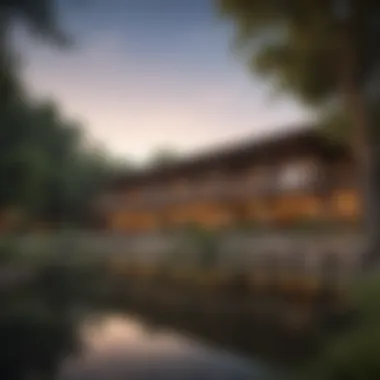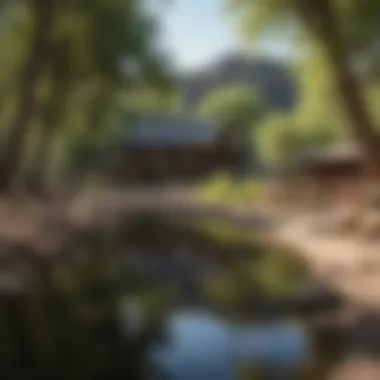Century Inn at Fossil Creek: Sustainable Hospitality


Intro
This article delves into the ethos of Century Inn at Fossil Creek, an establishment uniquely positioned at the intersection of hospitality and environmental advocacy. The Inn does not simply serve as a place for respite; it embodies a deeper commitment to sustainable forestry practices and community engagement. Through an analysis of its historical significance, architectural resilience, and its active contributions to the local ecosystem, we uncover how this institution fosters a sense of responsibility towards the environment and its community.
Forest Ecology and Biodiversity
Importance of Forest Ecosystems
Forest ecosystems play an indispensable role in maintaining ecological balance. They act as carbon sinks, help purify air and water, and support countless species. By preserving these vital habitats, Century Inn contributes to the health of the planet. The Inn's location nestled within rich woodlands amplifies its connection to these critical systems.
Flora and Fauna in Woodlands
The woodlands surrounding the Inn are home to a diverse array of flora and fauna. Species such as oak, pine, and maple trees dominate the canopy, while underneath, a vibrant undergrowth supports various herbs and shrubs. This biodiversity supports not only the wildlife residing there but also benefits the community through enhanced eco-tourism opportunities. The Inn offers guided nature walks, where guests can learn about the local ecosystem, deepening their appreciation for the natural world.
"Protecting our forests is tantamount to protecting our future. Their significance transcends mere aesthetics; they are essential for sustainability and biodiversity."
— Environmental Stewardship Advocate
Sustainable Forestry Practices
Techniques for Responsible Management
Sustainable forestry practices are pivotal in ensuring that woodlands are managed responsibly. Century Inn actively participates in these practices, employing techniques such as selective logging and reforestation. These methods aim to balance the economic benefits of logging with the necessity of maintaining forest health. Guests at the Inn are often briefed on these practices, fostering greater awareness about the impact of forestry on the environment.
Certification Schemes and Standards
Numerous certification schemes exist to guide sustainable forestry, such as the Forest Stewardship Council (FSC) and Sustainable Forestry Initiative (SFI). The Inn aligns itself with these standards, ensuring that the resources it utilizes are sourced ethically. This commitment not only enhances the Inn's reputation but also educates visitors about the importance of responsible consumption.
Community Engagement and Stewardship
Role of Local Communities
Engaging with local communities is a cornerstone of Century Inn's philosophy. By fostering partnerships with local organizations, the Inn supports environmental initiatives that resonate within the community. This relationship is symbiotic; the Inn benefits from the local knowledge and resources while contributing to the community's sustainability goals.
Volunteer Opportunities for Engagement
There are numerous opportunities for guests and locals to engage with the Inn's sustainability efforts. Volunteer programs focus on activities such as tree planting and habitat restoration. Involvement in these initiatives nurtures a sense of community and encourages ongoing stewardship of the environment. Through these programs, the Inn provides a pathway for people to make a tangible difference, reinforcing the value of active participation in environmental conservation.
Preamble to Century Inn
The Century Inn at Fossil Creek serves as a noteworthy example of how hospitality can intertwine with environmental awareness. It plays a significant role in promoting sustainable forestry practices and engaging the community. This establishment goes beyond mere accommodation, representing a commitment to eco-friendly initiatives and collaboration with local stakeholders. Understanding the Century Inn’s role offers insight into its broader impact on environmental stewardship and community enhancement.
Historical Background
The historical roots of Century Inn trace back to its establishment in the early 20th century as a modest lodge for travelers. Originally, it catered to those looking to experience the pristine beauty of Fossil Creek. Over the decades, it transitioned from a simple lodge to a venue embracing ecological responsibilities. This transformation mirrors broader societal shifts towards sustainability, carving a niche in eco-tourism and responsible travel. The Inn has retained historical features that showcase its architectural heritage, while evolving to ensure alignment with modern sustainable practices.


Location and Natural Surroundings
Located amidst lush forests and teeming wildlife, Century Inn occupies a prime position in Fossil Creek, a region celebrated for its natural beauty. The surroundings provide a rich tapestry of biodiversity, contributing to various recreational and educational opportunities for guests. Its proximity to significant natural attractions enhances the experience for visitors, allowing them to explore trails, waterways, and unique fauna. This location is not just a backdrop but an integral part of the Inn’s mission, encouraging guests to engage with the landscape responsibly. Emphasis is placed on minimizing footprints while maximizing appreciation of this fragile ecosystem.
Architectural Features of the Inn
The architectural features of Century Inn at Fossil Creek play a critical role in illustrating the establishment's environmental ethos. The design reflects not only aesthetic values but also a deep commitment to sustainability and ecological responsibility. By integrating nature with built structures, the Inn serves as an example of how architecture can harmonize with the surrounding environment while catering to guests' needs.
Design Principles
The design principles implemented at Century Inn are grounded in ecological sensitivity. This means the structure has been conceived to blend seamlessly with its surroundings. Large windows allow for natural light, reducing the need for artificial illumination. Moreover, the layout is carefully oriented to take advantage of existing landscapes, maximizing views and minimizing land disturbance. The intention is clear: create a serene retreat that fosters a connection with nature. This approach not only enhances guests' experience but also underlines the importance of sustainable design in modern hospitality.
Sustainable Materials Used
Sustainability is also reflected in the materials chosen for construction and renovation. The Inn predominantly uses locally sourced timber, which reduces transportation emissions and supports the local economy. Recycled materials are integrated into various aspects of the design, including furniture and fixtures. This effective use of resources emphasizes a circular economy, promoting better waste management and reducing the carbon footprint. Each material is selected with consideration of its environmental impact, aligning with the Inn’s mission of promoting sustainable practices.
Energy Efficiency Initiatives
Energy efficiency is another core aspect of the Inn's architecture. Several initiatives have been implemented to minimize energy consumption. For instance, advanced insulation technology has been introduced to maintain comfortable temperatures year-round. Additionally, solar panels are utilized to harness renewable energy, providing a significant portion of the Inn’s electricity needs. This not only lowers operational costs but also serves as a model for other businesses looking to improve energy sustainability. Furthermore, eco-friendly lighting solutions are installed, ensuring that energy use is kept to a minimum without sacrificing comfort.
"The architectural choices made for Century Inn demonstrate that hospitality can be both welcoming and responsible."
In summation, the architectural features of Century Inn are not just functional; they are a manifestation of the principles of sustainable design. By prioritizing ecological consideration in every aspect—from design to materials and energy efficiency—the Inn not only enhances the guest experience but also fosters a greater awareness of environmental stewardship.
Environmental Stewardship Practices
Environmental stewardship is a critical aspect of the operational framework at Century Inn at Fossil Creek. It refers to the responsible management and protection of the environment and natural resources. This approach not only helps to conserve the local ecosystem but also enriches the community. By integrating environmental stewardship into its core mission, Century Inn sets a benchmark for sustainable practices in the hospitality sector.
Establishing such practices benefits not just the immediate area but also resonates with a broader audience, promoting awareness about the critical issues surrounding environmental conservation. Guests and visitors are invited to participate in these initiatives, which serves to educate and engage the larger community. As a result, the Inn fosters a sense of shared responsibility towards environmental issues.
Programs for Local Conservation
Century Inn actively engages in various programs aimed at local conservation. These initiatives often focus on restoring habitats, protecting native species, and managing natural resources sustainably. One notable program is the annual tree-planting campaign which encourages locals and visitors to participate. Participants engage in planting trees, which aids in carbon sequestration and improves local biodiversity.
In addition, the Inn collaborates with local universities to conduct research on local ecosystems. This partnership not only helps in conserving flora and fauna but also creates awareness among students and visitors about the importance of conservation.
- Volunteer Days: These events allow community members to get involved in hands-on restoration projects.
- Educational Workshops: These sessions teach participants about sustainable practices and ecological impacts.
Partnerships with Environmental Organizations
Establishing strong affiliations with environmental organizations enhances the reach and effectiveness of Century Inn's stewardship practices. This collaboration allows for pooling of resources, knowledge exchange, and implementation of best practices. Organizations such as the Green Alliance and the Forest Stewardship Council have been pivotal in guiding the Inn’s objectives towards sustainable forestry.
These partnerships provide essential support in various forms:
- Training Programs: Staff members receive specialized training on environmental best practices from experts in the field.
- Funding Opportunities: Jointly applied grants help fund conservation projects that benefit the local ecosystem.


"Working with established environmental organizations amplifies the impact of our initiatives, making it possible to effectuate real, positive change in the community and beyond."
Through these collaborations, Century Inn at Fossil Creek continually seeks to adapt and improve its practices, ensuring its role as a leader in environmental stewardship.
Community Engagement and Education
Community engagement and education serve as cornerstones in the operational philosophy of Century Inn at Fossil Creek. This aspect not only enriches the guest experience but also connects visitors with the fundamental principles of environmental stewardship. By facilitating community involvement, the Inn creates pathways for individuals to contribute meaningfully to the local ecosystem.
Empowering community through education fosters a sense of ownership and responsibility among residents and visitors alike. Educational initiatives about sustainable practices create an informed public that values and protects its surroundings. Moreover, these engagements encourage dialogue about environmental issues, enhancing collective awareness and action.
The benefits of community engagement and education extend far beyond immediate actions. They help in cultivating long-lasting relationships between the Inn and local stakeholders, further anchoring its role in the community. As participants share knowledge and resources, their collective impact on conservation strategies strengthens, resulting in more resilient ecological systems.
Workshops and Training Programs
Century Inn hosts a variety of workshops and training programs aimed at enhancing skills related to sustainability. These sessions cover diverse aspects of environmental conservation, from land management and tree planting to waste reduction strategies. They are often conducted by experts featuring insights from institutions dedicated to forestry and environmental studies.
Participation in these programs not only uplifts individuals’ knowledge but also galvanizes group efforts towards shared goals. Beneficiaries return to their communities equipped with fresh ideas, and practical skills that can be implemented locally. For instance, a workshop focusing on responsible forestry practices imparts valuable knowledge to local landowners, promoting changes that potentially enhance local biodiversity.
The Inn prioritizes inclusive programming, offering opportunities to various community demographics, including schools, civic organizations, and environmental groups. This approach enhances community cohesion, instilling shared values of sustainability while providing clear frameworks for engaging with natural resources.
Volunteering Opportunities
Volunteering opportunities at Century Inn are designed to integrate visitors into the local fabric while fostering environmental involvement. The Inn collaborates with organizations dedicated to conservation efforts, offering guests hands-on experiences that directly benefit the ecosystem.
Participating in local restoration projects, such as invasive species removal or tree planting drives, cultivates a sense of achievement among volunteers. These experiences often lead to heightened environmental awareness and a genuine connection to the land, as volunteers witness the immediate impact of their contributions.
Moreover, the Inn’s volunteer programs provide avenues for networking with like-minded individuals, creating a community of environmental advocates. Engaging with locals strengthens bonds and encourages collective action, which is essential for sustained ecological advocacy. Through volunteering, both residents and visitors can experience firsthand the importance of stewardship, shaping future environmental leaders.
Impact on Local Ecosystem
The impact of Century Inn on the local ecosystem is a critical focal point in understanding its overall contribution to environmental sustainability. By implementing various initiatives aimed at enhancing biodiversity and restoring natural habitats, Century Inn not only mitigates the potential negative effects of tourism but also actively contributes to preserving the ecological balance of the region. This role emphasizes the significance of hospitality industries adopting practices that prioritize environmental consciousness and stewardship.
Through strategic efforts, Century Inn is enhancing not only natural resources but also fostering a robust community that values sustainability. This dual approach addresses both ecological needs and local engagement, creating a model that other establishments can replicate.
Biodiversity Enhancement Initiatives
Biodiversity plays a vital role in maintaining the health of ecosystems. At Century Inn, various biodiversity enhancement initiatives have been introduced to increase the variety of plant and animal life in the area. These initiatives encompass habitat restoration, native plant gardens, and creation of wildlife corridors. By increasing the number of native species, the Inn supports pollinators and other wildlife that contribute to a balanced ecosystem.
Some key initiatives include:
- Native Plant Preservation: The Inn has developed gardens that feature indigenous flora. This attracts local pollinators, helping to support their populations while also beautifying the landscape.
- Habitat Creation: Efforts are made to restore and enhance habitats by planting trees and shrubs that provide necessary shelter and food sources for local wildlife.
- Monitoring Programs: Regular assessments are conducted to monitor the health of local species, ensuring that their populations are stable and not declining.
These actions demonstrate a robust commitment to fostering biodiversity in an environment often stressed by urban development and human activity.
Restoration Projects


Alongside biodiversity initiatives, Century Inn invests in restoration projects aimed at reversing ecological degradation in the locality. These projects focus on rehabilitating areas that have suffered from invasive species, pollution, or deforestation. Through these efforts, the Inn aims to restore ecosystems to their native conditions, thereby enhancing the resilience of local habitats.
Key restoration projects include:
- Invasive Species Removal: Regular removal of non-native plant species helps restore the natural balance and allows native plants to thrive.
- Stream Restoration: Projects to restore degraded waterways enhance water quality and habitat for aquatic life.
- Soil Rehabilitation: Amending soils with organic matter improves fertility, benefiting plant growth and overall ecosystem recovery.
"Restoration is not just about fixing what is broken. It’s about creating a future where the environment flourishes for generations to come."
These restoration projects demonstrate a long-term vision for enhancing the local ecosystem and transforming Century Inn into a steward of both ecological and community welfare.
Eco-tourism and Sustainable Travel
Eco-tourism and sustainable travel have gained prominence in recent years. This growth reflects an increasing awareness of the environmental impacts of traditional tourism. The aim is to promote responsible travel to natural areas. Additionally, eco-tourism focuses on conservation, engages local communities, and makes a positive impact on those areas. At Century Inn, eco-tourism embodies these principles, creating connections between guests and the surrounding natural environment while encouraging sustainable practices.
One key element in promoting eco-tourism is to foster a deep awareness of environmental issues. Century Inn does this by offering educational programs. These initiatives cover various topics, including local wildlife, vegetation, and ecosystems. Such knowledge encourages guests to appreciate and protect the natural surroundings.
There are benefits in sustainable travel as well. Not only does it contribute to environmental conservation, but it also boosts local economies. By prioritizing eco-friendly practices, communities can create a sustainable future. This is vital for regions where traditional industries may decline. Eco-tourism helps ensure that local culture and traditions are preserved.
Promoting Eco-friendly Practices among Guests
At Century Inn, the focus on eco-friendly practices is evident. The Inn incorporates sustainability into every aspect of the guest experience. For instance, guests are encouraged to use refillable water bottles, minimizing plastic waste. Information about recycling programs is readily available. This simple action contributes positively to the surrounding environment.
Additionally, using public transportation is highly recommended. The Inn organizes guided eco-tours, allowing guests to explore the area without relying on personal vehicles. These tours also emphasize low-impact hiking and respectful interactions with nature. Guests learn how to minimize their ecological footprint while still enjoying their stay.
Through workshops and seminars, Century Inn promotes sustainable practices. Topics can vary from energy conservation to wildlife protection. Such events inspire guests to incorporate eco-friendly habits into their everyday lives, ensuring that the impact of their stay extends beyond the Inn.
Economic Benefits to the Local Community
Eco-tourism not only supports environmental goals but also brings economic advantages to the local community. Century Inn plays a crucial role in promoting local businesses. By partnering with nearby farms and artisans, the Inn provides guests with authentic experiences. When visitors purchase handmade crafts or local produce, money circulates within the community.
Moreover, eco-tourism helps create jobs focused on sustainability. These positions can include park rangers, tour guides, and hospitality staff in eco-friendly accommodations. Such employment opportunities are essential, especially in rural areas where job options may be limited. Promoting environmental awareness and sustainable practices also enhances local pride. Residents become stewards of their environment, knowing that their actions impact both their community and future generations.
Ending
In exploring the significance of Century Inn at Fossil Creek, it becomes clear that the intersection of hospitality and environmental stewardship is not only beneficial but essential. This establishment exemplifies how sustainable practices can be integrated into the tourism sector, promoting both ecological and economic health.
Summary of Insights
The analysis presented illuminates several key points about Century Inn:
- Historical Relevance: It has evolved within a historical context that recognizes the importance of sustainable forestry.
- Architectural Integrity: Designed with sustainability in mind, its architectural features minimize environmental impact.
- Community Engagement: The Inn plays a vital role in fostering community ties and educating the public about ecological conservation.
- Eco-Tourism Appeal: It attracts eco-conscious travelers, thus bolstering the local economy while promoting responsible tourism.
These insights underscore that environmentally conscious practices in hospitality can create a ripple effect that benefits local ecosystems and communities alike.
Future Directions for Century Inn
The future for Century Inn appears promising yet demands continued dedication to its core principles. Possible approaches include:
- Innovative Programs: Developing more educational workshops to engage visitors in hands-on conservation efforts.
- Strengthening Partnerships: Building collaborations with environmental organizations to amplify conservation efforts and awareness.
- Expansion of Eco-Tourism: Exploring additional eco-friendly offerings could enhance visitor experiences and create a model for sustainable travel.
By prioritizing these elements, Century Inn can further establish itself as a leader in the movement toward sustainable hospitality and environmental stewardship, ensuring that its mission aligns with the ongoing challenges of our planet.















